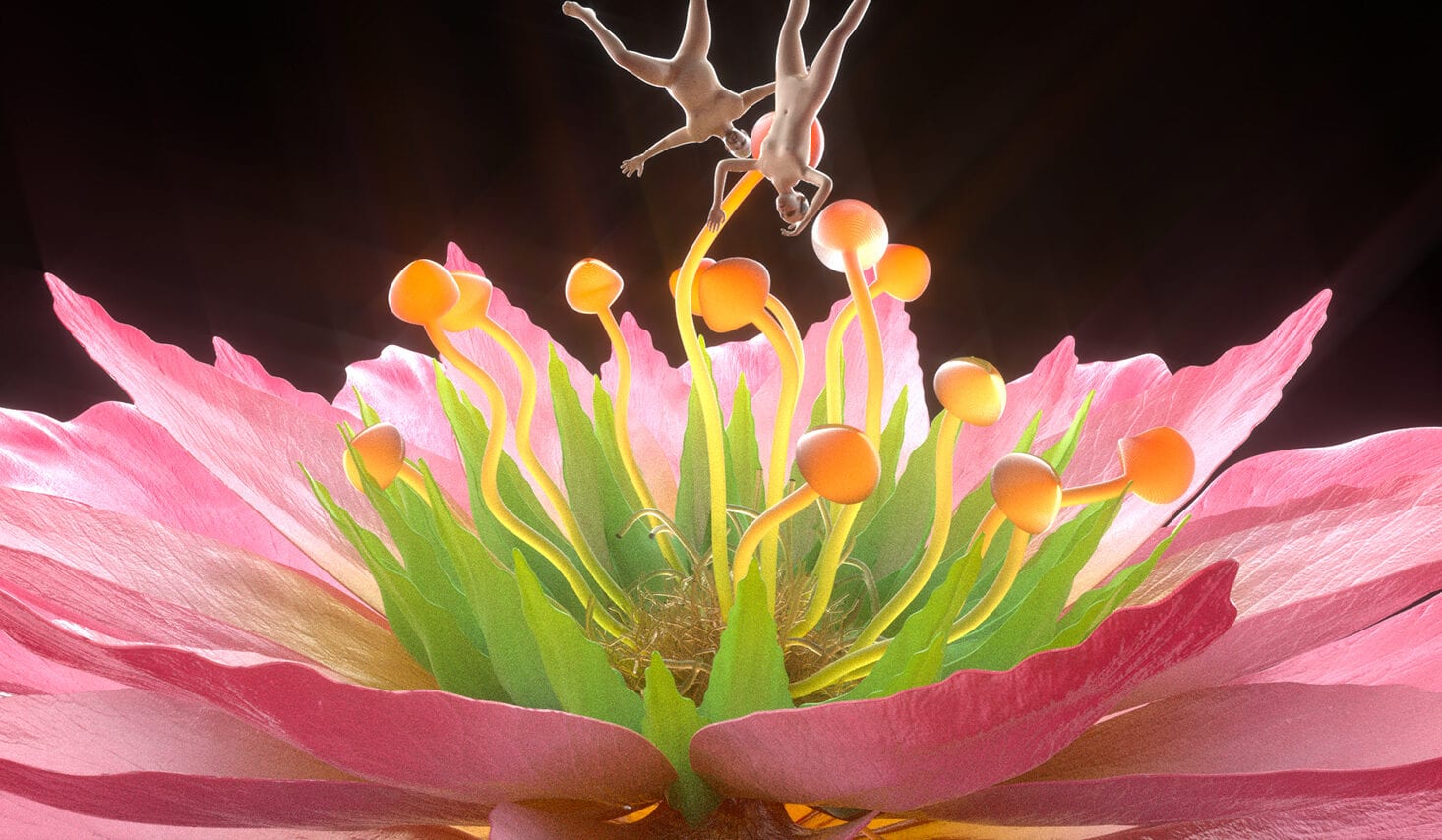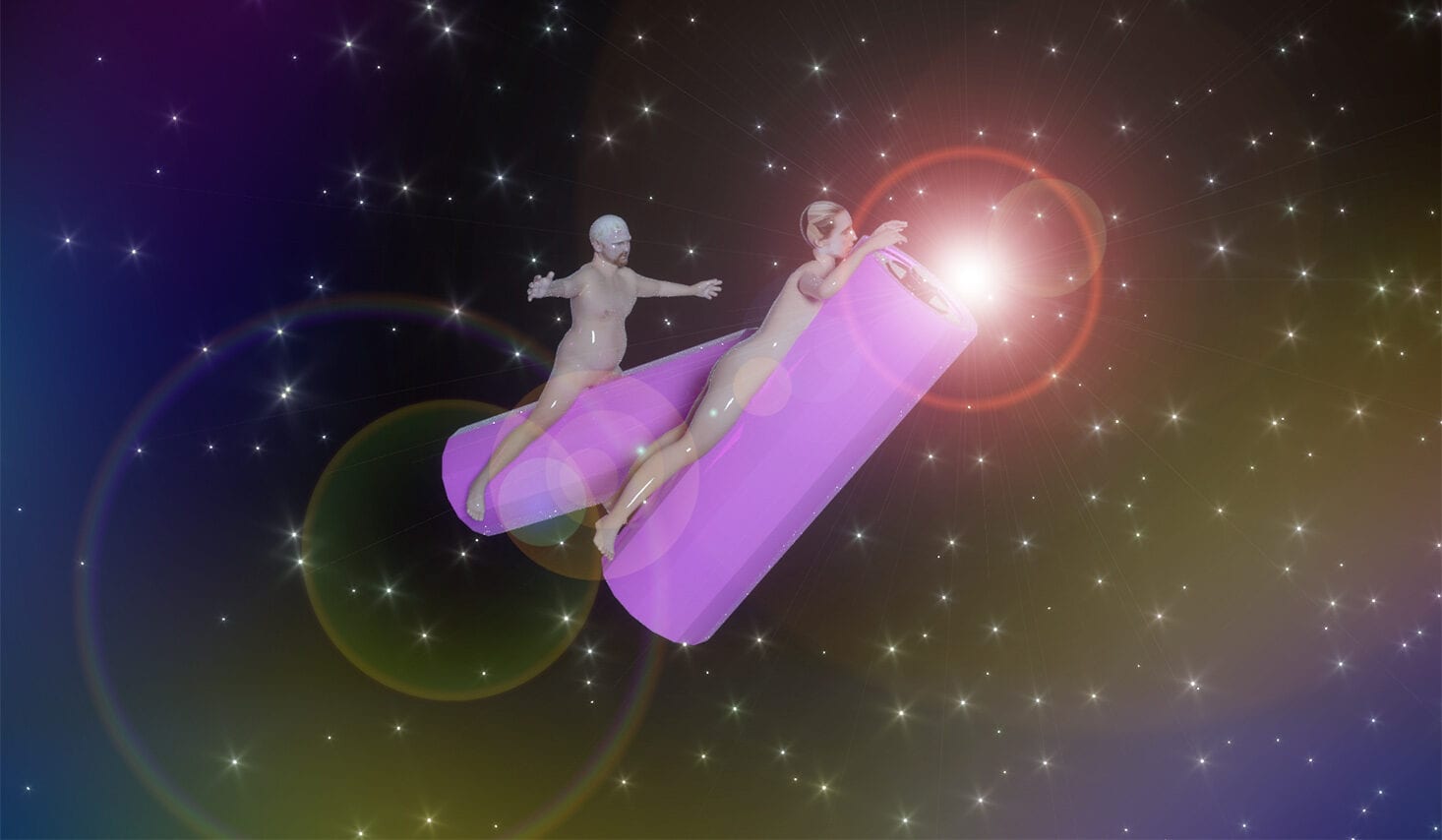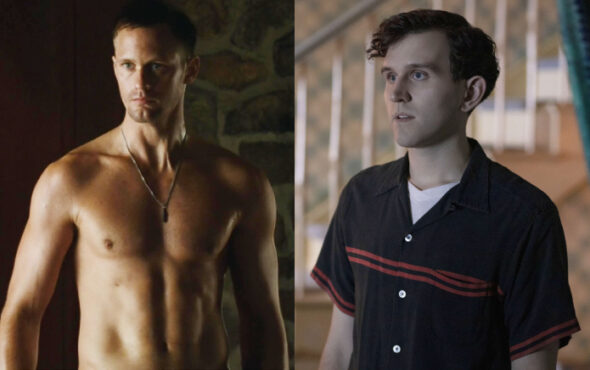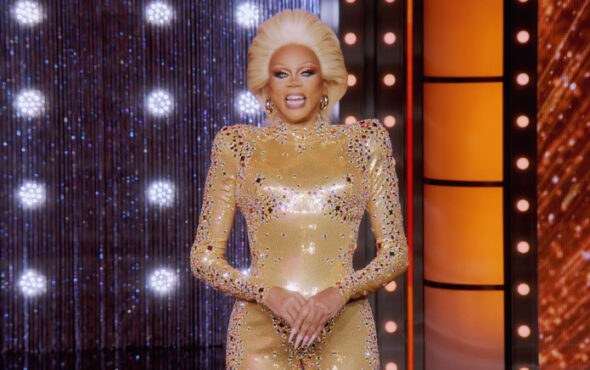
Tom Rasmussen and Hatty Carman have lived and worked together for seven years. From the early days of paying £15 rent a week to live in what they describe as “close to a squat as you could get while still paying,” through numerous jobs and wild festival memories, they’ve learned that queer joy is what’s been vital to their survival. “The heart, I think, of gay culture and queer culture is joy and humour,” says Tom, sat next to Hatty on a Zoom call. “It’s what saved me in high school and it’s what saved me in my 20s.”
It’s for that reason that their band, Thigh High, puts this unadulterated queer joy at the centre of their songwriting. This summer, the group – which now consists of six members – started to put out music they’ve lived with for more than five years. Nannas on a Rampage saw Tom and Hatty take on older versions of themselves, causing chaos in the streets of London. Follow-up Go Slow is an earworm anthem that builds and builds into a pop rocket of frenetic energy that essentially tells the story of a dildo running out of batteries. It’s unconventional, but incredibly enjoyable. And there’s more on the way.
After playing hundreds of gigs with these songs, they are giving them a more widely-available release. Previously the only way you’d have gotten these songs is from popping a balloon at their gig with a USB stick inside that had the album on. Both imaginative and iconic, but we suspect making the songs available on music streaming services will help get the word out there a little bit more.
We caught up with Tom and Hatty from Thigh High to talk about their latest music video, why Barbie and Ken is a real-life motif they come back to on their new album, and how they use humour as their great strength.
Congratulations on your recent releases. When you were recording Go Slow you must have recognised you were onto something with that track in particular?
Tom: I mean, frankly, all of the music we are releasing right now was born five years ago, and it’s been developed for ages. Hatty and I have lived and worked with each other for like, seven years or something. When we do it live, the song has gone down so amazingly. We had thought about recording it, but we had this phase of being so dedicated to being like hard queer, that we were like, ‘We are going to be ephemeral. We’re not going to get any social media, we’re not going to record anything.’ So I guess in terms of like popularity, everyone always requests the three songs we’re releasing.
Hatty: Go Slow is one that people remember most. It is really catchy, but I find it quite an unusual song in that it’s just a repeat of a chorus again and again. And this weird intro. So you’re like, ‘Oh, is this boring?’
But that’s why it’s catchy. Then it speeds up and builds that energy. And when that guitar comes in…
Hatty: That’s actually Tom’s dad playing the guitar!
Oh wow! Well done Papa Rasmussen.
Tom: He’s a really good musician. He’s a music teacher, but he’s sort of an amazing musician in his own right and he despairs that I can’t play an instrument. It’s very funny. But you know what it’s like? It’s hard with anything you do yourself to know whether it’s good or not, right? Every song we wrote for this album is arguably a kind of manifesto, which sounds really tacky. But Hatty is an amazing musician and comes up with the melodies and often comes up with the hooks and then we’ll write lyrics and some melodies together. Each one is really particularly about a thing and this one is about the moment when the batteries in the dildo die.
Hatty: As we’re so queer, we thought well, why not deliver a happy fun, empowering message? If it’s catchy, then people will engage a bit more in that sort of way.
Tom: Often we found that there’s so much amazing queer music out there. I guess we wanted to make like catchy rock-pop. It makes it sound like a sort of iconic gigging band from Lancashire! It’s like queer pub rock! But ultimately it’s a song about joy.
I’m now obsessed with the newly invented genre of queer pub rock. We need to talk about the music video. Are you sex dolls or robots? What are you in it?
Hatty: Well, it’s very interesting because this video came about because of lockdown. We always knew we wanted to do animation. I got into it as in, I went on YouTube and learned some tutorials. We couldn’t obviously film anything because it was lockdown. So we got in contact with this amazing animator called Amalie [Smed Dawids] in Copenhagen. She was like, ‘I’ll make you a video, but you have to send me your avatars.’ So I was like, ‘I accept this challenge.’ We photographed ourselves and I built the models on our computer.
Tom: What are we?
Hatty: I think we wanted to be representative of us. And then you wanted us to be naked. You know Marilyn Manson’s cover where there’s sort of this genderless alien? This sort of smooth Barbie doll. That’s why we’re shiny. I think that was a big inspiration for us.
Tom: Barbie and Ken are the real-life motif we come back to on the album. Hatty’s Ken and I’m Barbie. It’s this idea that – it’s so fun but so basic – but anyone can be Barbie or Ken because Barbie and Ken doesn’t exist because it’s a construct like gender. And beauty standards are a construct too. I guess we wanted to be weird plastic versions of ourselves. It’s not really that we are sex dolls. But weirdly, the next song we’re releasing is about a sex robot revolution. Obviously this is a super small project right now, but we’re hoping to see it grow. One of the things that we thought about a lot is what pop music – which we’re both fucking obsessed with, we grew up on pop music – but its relation to capitalism, and how capitalism really hurts queer people. So you have to create other worlds for us to exist in, in order to not be pushing a capitalist message with the music and videos. You don’t want it to be like, ‘Look at all these amazing things that we have and that we are.’ Do you know what I mean? Does that make sense?
Queer people have generally been drawn to that manufactured business model of pop and the stars it produces, but that system also abuses queer people and doesn’t always represent them in the way they should be represented.
Hatty: I think a lot of queer people are aware of that. We all have to enter into it because that’s the world we live in. But behind closed doors a lot of us have these fantasy realms that keep us safe. That allows us to interpret the world and kind of have respite from it.
Tom: It’s why we all have problematic faves, isn’t it?
What I love about Thigh High is that you’ve said you want to put unadulterated queer joy at the centre of all your songs. Why was that important to you?
Hatty: We always felt like our sense of humour was our strength. Taking that humour into our songwriting was quite fun.
Tom: Hatty’s a drag king and I’m a drag queen as well, so we’ve learned a lot of our trade from those things. I remember we supported a band who had just been signed by a major label, and I forget if they said it to us or someone else, but someone from the record label was like, ‘Humour just doesn’t work in music.’ They then watched us, and between each song we do these narrative moments – it’s not like Othello! – but it’ll be like, ‘And the next song is one we wrote in the 60s’ and they’re all these jokes within jokes. There is a place for humour in music.

Hatty: As queer people get pushed into the mainstream – there’s never been more visbility – I feel like we’re encouraged by the straight mainstream to tell our stories of sorrow. Obviously a lot of us have these stories of challenge and difficulty growing up – and that continues today. And those stories should be shared and told and the world should learn about them. I think what a lot of queers really feel is that there’s a lot of joy to it, and it’s not just this big burden that ruined our lives. It’s actually a wonderful thing. The cynicism and sarcasm, and the sort of jokes that we all have in the queer community and our small circles are absolutely hilarious. We kind of want to get that out there and change the way that people see us.
Tom: Which is why it’s so nice to talk to you and GAY TIMES about this because you understand that. You can make more noise and money and there will be more of a splash through traumatic stories than like, ‘This is my perspective, and it’s really joyful.’ The heart, I think, of gay culture and queer culture is joy and humour. It’s what saved me in high school and it’s what saved me in my 20s. The world is hard for us – and we all feel that, see that and fight for that – the only respite is that joy that we find in our difference.
I’ve been speaking to quite a few people recently about how the narrative around coming out needs to shift. We’ve grown up thinking it’s something to be feared because of the storylines we see in TV and film that are loaded with so much tragedy. Some mainstream shows are dealing with it more as a coming of age story now rather than a coming out moment, which is so much more representative.
Tom: We are so much more than our coming out. God knows we’ve all probably come out like a hundred times. You either come out or you are outed every day! I think about this a lot. For me there’s so much more queer visibility and representation. But sometimes I’m in a meeting and talking about queer TV characters for example, but then I’m like, ‘Hang on, there’s actually not that many.’
When you were coming up with the name of Thigh High, were you thinking about your SEO ranking? Because when I googled you earlier it came up with a load of tabloid headlines. The first one was, ‘Cyndi Lauper, 62, goes hell for leather in thigh high boots as she kicks off country music tour’.

Tom: [Laughs] We did not think about our SEO ranking…
Hatty: But we’re gonna use that for something now!
Another one is, ‘Let’s Get Loud! J-Lo returns to recording studio in leather thigh high boots and short shorts.’
Tom: I mean, basically that is the kind of press we really want.
Hatty: I think we need to recreate all these paparazzi photos and that would be the headline! I’m an illustrator so we’re going to make a zine that comes with the record that’s going to include a little explanation of our songs. There’s a big backstory to each one.
Tom: It’s a good point. There’s no right way to choose the perfect band name. Trust me.
Hatty: What we did was get a load of words and chopped them all up and just started rearranging them to try and get some band names. Eventually we got Thigh High which is a phrase in itself, but we just thought it reflected fun boots and it’s also like sky high. I love that we probably are not even on page 15 of this Google search!
Don’t worry, we’ll work on that SEO. We’ll get you there.
Hatty: Thank you for bringing this to our attention – that’s really fun. I think we should print them out.
Tom: I agree. We’ll put them on a mood board!
Thigh High’s new songs Nannas on a Rampage and Go Slow are available to stream and download now.


